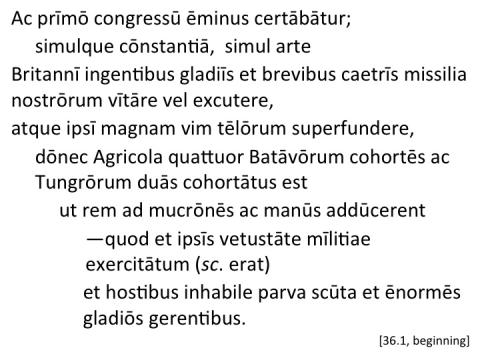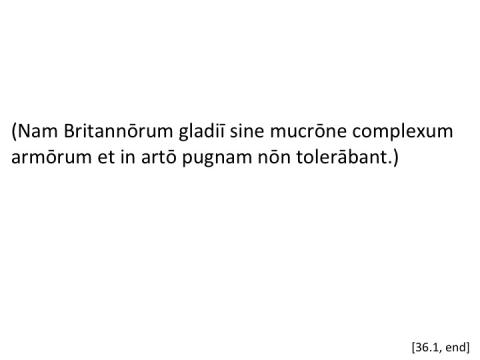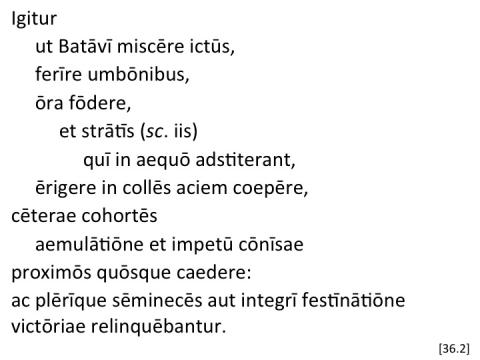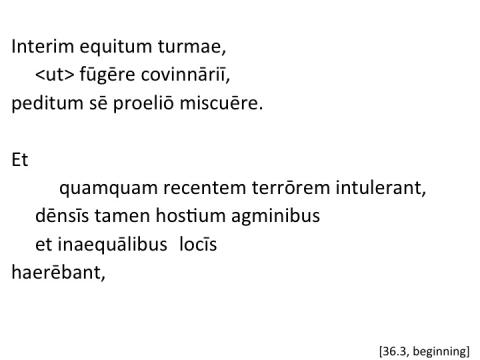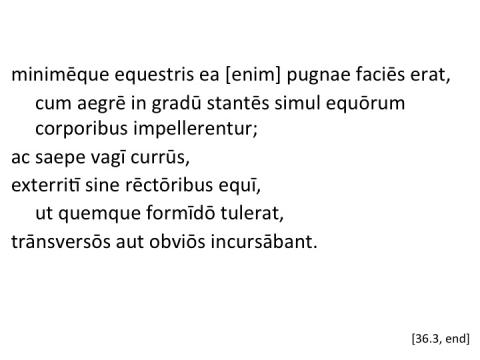Overview: The Britons stand their ground under a galling fire; preceded by six cohorts, the Romans rush to close quarters; the Roman cavalry precipitates itself into the conflict to the confusion of both friends and foes. (Stuart); this chapter begins on f. 62v of the codex Aesinas.
36.1
cōnstantiā ... arte: "persistently and skillfully." Ablatives of manner. (Gudeman) [A&G 412] arte: the skill with which they rendered the missiles ineffective. (Stuart)
ingentibus gladiīs et brevibus caetrīs: so in comparatively modern times the large claymore and the small round targe were the national weapons of the Highland Scotchman. (Stuart)
excutere: “parry.” The infinitives are arranged chiastically with reference to the preceding ablatives. (Stuart); “parry” with gladiīs; vītāre with caetrīs. (Pearce)
Batāvōrum: the Batavians were a German tribe who dwelt on the island of the Lower Rhine and in the adjacent regions. Troops of this nationality played an important part in the Roman army from the campaigns of Germanicus on. They were particularly noted for their skill in swimming. See note on chapter 18. (Stuart)
Tungrōrum: this people crossed the Rhine and settled in what is now Belgium, near Liege. (Stuart); another German tribe. (Gudeman)
ad mucrōnēs: the Roman swords were short and adapted for stabbing. Hence, instead of the usual ad gladiōs, the distinctive feature of the Roman sword is brought out. (Pearce) mucrōnēs ac manūs: equivalent to the more common cōminus, as opposed to ēminus above. (Gudeman)
quod = quod genus pugnandī. (Gudeman) quod ... exercitātum: i.e. this mode of fighting had become familiar to Agricola's soldiers by practice, owing to their long military service. (Gudeman) vetustāte mīlitiae: "by long service in warfare." (Stuart) exercitātum: sc. erat. (Damon); “had been rendered adept.” The usual construction with exercitārī requires a subject denoting the person trained. (Stuart)
et ... et = cum ... tum, “on the one hand ... on the other." (Gudeman)
inhabile: sc. erat, “awkward, difficult to deal with"; explained by parva ... gerentibus; a further explanation being added in nam ... tolerabant. (Pearce) hostibus inhabile: the short Roman gladius was adapted to the thrust; hence, the legionary shone at close quarters. (Stuart)
sine mucrōne: “pointless.” Sine with a noun is the usual substitute in Latin for a missing negative adjective. (Gudeman); the prepositional phrase, which is dependent on gladii, functions as an adjective here rather than adverbially, as is usual. (Damon)
complexum armōrum: “a grapple.” (Pearce); “hand-to-hand fight.” The phrase seems to occur only here. (Gudeman)
tolerābant: tolerāre with an inanimate subject is very unusual. (Pearce; a bold personification. ... On a similar statement about the Germans in battle, see Ann. 2.21. (Gudeman)
36.2
miscēre: the idea is of blows inflicted in such rapid succession that the intervals between them were scarcely perceptible. See Vergil, Aeneid, 5.459: densīs ictibus … pulsat. (Stuart); “deal blow on blow, rain blows.” (Pearce); “dealt out blow upon blow.” (Gudeman)
ferīre umbōnibus: at close quarters the shield was sometimes utilized both by the Greeks and the Romans as a weapon of offense. (Stuart)
ōra fōdere: a common phrase, e.g. Ann. 2.21; Liv. 8.10,6. With the entire passage, see Polyb. 2.33. (Gudeman)
ērigere … aciem: see ch. 18.2. (Stuart)
proximōs quōsque: for the singular (in Tacitus only here and Ann. 14.31, praecipui quique) is extremely rare … . It was used in the present passage to indicate that the enemy approached in groups, not singly, one after another. (Gudeman)
sēminecēs: for sēmivīvōs is a Vergilian word, frequent in post-Augustan poetry, but very rare in prose. (Gudeman)
36.3
interim: the narrative turns to the cavalry who had engaged the chariot corps apparently while the fight between the opposing bodies of infantry was in progress. It is difficult to see how the infantry could have closed until after the chariots had been dislodged from the middle of the field. Tacitus does not concern himself with this detail. (Stuart)
equitum turmae, etc.: the Roman cavalry, after defeating the covinnārius eques (35.3) charged the enemy's infantry. Of course, the chariots must have been cleared out of the way before the infantry battle began. (Pearce) equitum turmae <ut>: the conjunction is added to clarify the syntax. Gudeman's elaborate explanation of this passage, which has not found general acceptance, is omitted here. (Damon)
et: “and yet"; see note on chapter 3.1. (Stuart)
recentem: from the point of view of the Britons, hard pressed by the Roman foot. (Stuart) recentem ... intulerant: i.e. by the defeat of the covīnnāriī. (Pearce) recentem terrōrem: a fresh source of panic, in addition to that inspired by the victorious infantry. The same phrase occurs repeatedly. See also note ch. 32.3. (Gudeman)
densis ... locis: ablatives of means with haerēbant, “were checked.” (Pearce) [A&G 409]
ea pugnae facies: cavalry require space and a level country for effective maneuvers. Conditions at this juncture of the combat did not meet either of these demands. (Stuart); on the metaphor ... see note ch. 38.2. (Gudeman)
aegrē in gradū stantēs: an acceptable emendation of the garbled text of the manuscript, aegradiu autstante (see line 21 of the right-hand column). Many others have been proposed, including that accepted by Stuart (see note below). (Damon) aegrē clīvō īnstantēs: the text at this point is so mutilated that we can only guess what Tacitus really wrote. For the subject of impellerentur supply, as a makeshift, nostrī. (Stuart)
impellerentur: the subject seems to be the Roman infantry; the horses were those of their own cavalry. The two points in which the Romans fought at a disadvantage were (1) the difficulty of keeping their footing in their struggle up hill; (2) the pressure of their own cavalry, which seems to have been forced by the nature of the ground upon the infantry. (Pearce)
ac saepe, etc.: again a point in which (as it seems from the context) the Romans suffered. (Pearce)
sine rēctōribus equī: "riderless horses"; a final touch to the portrayal of the difficulties attending the Roman advance. (Stuart); a reminiscence of Sall. Hist. fr. 1.139 Maurenbrecher. (Gudeman)
trānsversōs aut obviōs: supply Romanōs. The frightened animals ran either across the line of the advance or straight toward it. (Stuart); notice how in this and similar expressions the point of view ... is that of the attackers. (Pearce)

